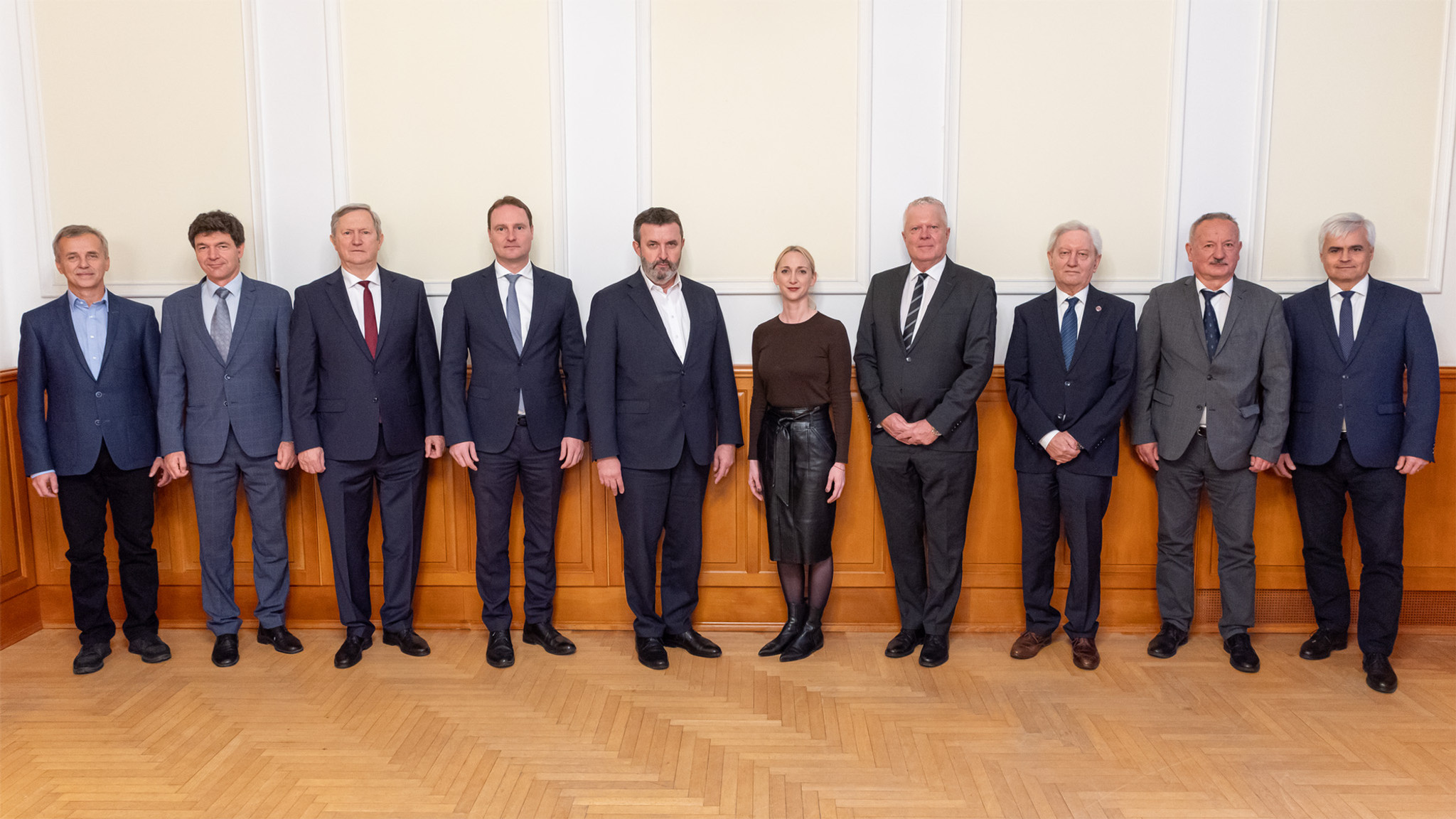SZE joined forces with several partners to implement the Hungarian Genome Programme
A cooperation framework agreement was signed by Prof. Dr. László Palkovics, Chairman of the Board of Trustees of the Foundation for Széchenyi István University, Dr. Bálint Filep, President of Széchenyi István University, Prof. Dr. Ferenc Friedler, Rector of Széchenyi István University, Prof. Dr. József Bódis, President of the Universitas Quinqueecclesiensis Foundation, Prof. Dr. Attila János Miseta, Rector of the University of Pécs, Zoltán Jenei, Director General of the National Hospital Directorate General and Dr. István Vályi-Nagy, Director General of the National Institute of Haematology and Infectology of the South-Pest Hospital Centre, in the banquet hall of the National Institute of Haematology and Infectology of the South-Pest Hospital Centre on 21 November 2023. The aim of the agreement is to jointly elaborate the details of the implementation of the Hungarian Genome Programme and propose its launch by 31 March 2024.
In the framework of the programme, the genome sequencing of 10,000 healthy or diseased Hungarians can be carried out over five years. The focus will be on the study of a (representative) number of the Hungarian population not suffering from any diseases, as well as on individual and population genomic data processing of patients with malignant tumours, cardiovascular and metabolic diseases and certain patients with high genetic risk, such as rare diseases, and their family members.
The research, development and innovation (R&D&I) cooperation will result in the launch of nationwide health promotion, prevention, molecular screening and personalised therapy programmes. It could open up the possibility of researching new genetic features specific to certain diseases, tracking those already discovered and preventing them from getting worse.
Due to the development of molecular biology and information technology, national and international biomedical researches have made significant progress in recent years, leading to a transformation in the practice of medicine. Research, diagnostics and targeted therapeutic treatments will be partly genomics-based using next-generation sequencing technologies. Genomics studies require significant infrastructural, intellectual and economic resources, which are only available in countries with significant resources that can operate them in a coordinated way. Currently in Hungary these conditions are only partially present, in most cases scattered. Therefore, the aim of the cooperating parties is to initiate a comprehensive, coordinated programme representing both multi-disciplinary and national economic interests, which is unique not only in Hungary but also in the Central and Eastern European region.
As a result of the pooling of resources of the participating institutions, the basic elements of the Hungarian Genome Programme have been developed at the practical level and are available. For the clinical and data science analysis of a large number of patient parameters, the domestic regulatory and technological environment is increasingly creating opportunities for R&D&I collaborations that are of high public health importance and provide a significant competitive advantage for the healthcare industry at an international level, as well as for the service and product development in the healthcare industry.

Participants of the signing ceremony: Prof. Dr. Zoltán Horváth, Dean of the Faculty of Mechanical Engineering, Informatics and Electrical Engineering of Széchenyi István University, Dr. Attila Gyenesei, Head of the Hungarian Genomics and Bioinformatics Centre of the Szentágothai János Research Centre of the University of Pécs, Prof. Dr. Ferenc Friedler, Rector of Széchenyi István University and Vice President for Academic Affairs, Dr. Bálint Filep, President of Széchenyi István University, Prof. Dr. László Palkovics, President of the Board of Trustees of the Foundation for Széchenyi István University, Gabriella Szűcs, Programme Director, Dr. István Vályi-Nagy, Director General of the National Institute of Haematology and Infectology of the South-Pest Hospital Centre, Prof. Dr. József Bódis, President of the Universitas Quinqueecclesiensis Foundation, Prof. János Attila Miseta, Rector of the University of Pécs and Zoltán Jenei, Director General of the National Hospital Directorate General. (Photo: Adorján András / Széchenyi István University)
At the signing ceremony Prof. Dr. László Palkovics emphasized that Széchenyi István University plans, implements and operates the database of the Hungarian Genome Programme, the database-based data service with data analysis and modelling, including artificial intelligence analysis, Big Data analysis and services. The institution provides the necessary IT tools, including sufficient storage space and high-performance computing capacity.
"The information that can be extracted from the huge amount of data collected from healthcare providers, with the appropriate technological background and analytical capabilities, will create the conditions for Széchenyi István University to use its existing industry-related competences and skills - automation, Industry 4.0, IT, telecommunications, mathematical modelling and simulation - in healthcare", he said."The University of Pécs set the development of the fields of genomics and bioinformatics as a strategic goal five years ago. Thanks to this, the Hungarian Centre for Genomics and Bioinformatics, with its unique genomics and IT infrastructure and specialist staff, has been established, which ensures that the processing, sequencing and bioinformatics analysis of the samples to be included in the programme are carried out according to international standards", said Prof. Dr. József Bódis, President of the Universitas Quinqueecclesiensis Foundation.
"Over the past five years, the National Institute of Haematology and Infectious Diseases of the South-Pest Hospital Centre has established the Research Centre for Translational Medicine, the National Haematology and Infectious Diseases Registry and the National Infectious Diseases Public Health Programme. Our institution and our partners have developed the data generation, collection, storage and analytical value chain that can become the medical and methodological backbone of the Hungarian Genome Programme to be established", Dr. István Vályi-Nagy, Director General emphasized.











